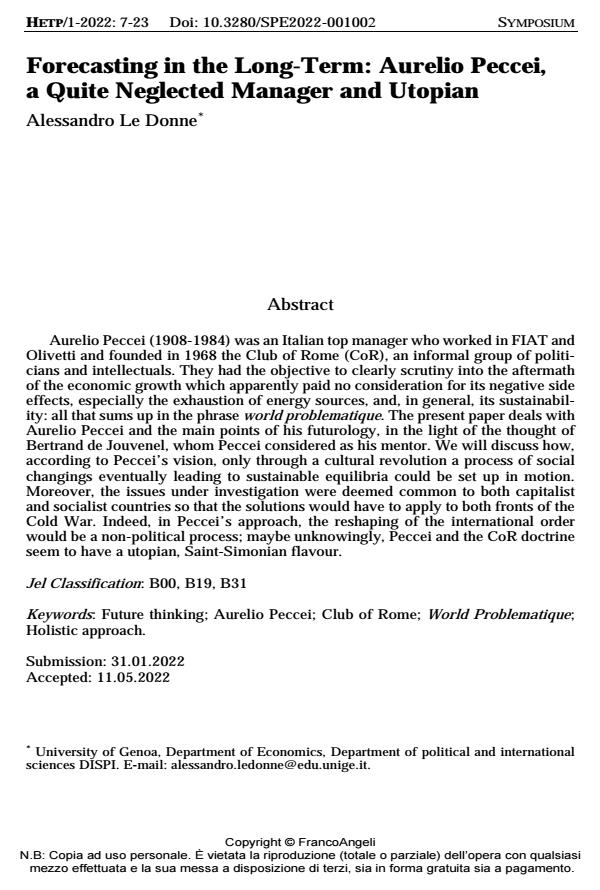Forecasting in the Long-Term: Aurelio Peccei, a Quite Neglected Manager and Utopian
Journal title HISTORY OF ECONOMIC THOUGHT AND POLICY
Author/s Alessandro Le Donne
Publishing Year 2022 Issue 2022/1
Language English Pages 17 P. 7-23 File size 98 KB
DOI 10.3280/SPE2022-001002
DOI is like a bar code for intellectual property: to have more infomation
click here
Below, you can see the article first page
If you want to buy this article in PDF format, you can do it, following the instructions to buy download credits

FrancoAngeli is member of Publishers International Linking Association, Inc (PILA), a not-for-profit association which run the CrossRef service enabling links to and from online scholarly content.
Aurelio Peccei (1908-1984) was an Italian top manager who worked in FIAT and Olivetti and founded in 1968 the Club of Rome (CoR), an informal group of politicians and intellectuals. They had the objective to clearly scrutiny into the af-termath of the economic growth which apparently paid no consideration for its negative side effects, especially the exhaustion of energy sources, and, in general, its sustainability: all that sums up in the phrase world problematique. The present paper deals with Aurelio Peccei and the main points of his futurology, in the light of the thought of Bertrand de Jouvenel, whom Peccei considered as his mentor. We will discuss how, according to Peccei’s vision, only through a cultural revolu-tion a process of social changings eventually leading to sustainable equilibria could be set up in motion. Moreover, the issues under investigation were deemed com-mon to both capitalist and socialist countries so that the solutions would have to apply to both fronts of the Cold War. Indeed, in Peccei’s approach, the reshaping of the international order would be a non-political process; maybe unknowingly, Peccei and the CoR doctrine seem to have a utopian, Saint-Simonian flavour.
Keywords: Future thinking; Aurelio Peccei; Club of Rome; World Problematique; Holistic approach.
Jel codes: B00, B19, B31
Alessandro Le Donne, Forecasting in the Long-Term: Aurelio Peccei, a Quite Neglected Manager and Utopian in "HISTORY OF ECONOMIC THOUGHT AND POLICY" 1/2022, pp 7-23, DOI: 10.3280/SPE2022-001002